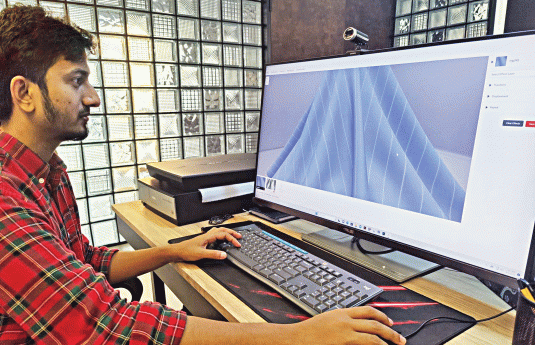Digital fabrics development aiding exports

Bureau 555, a joint venture between two entrepreneurs of Bangladesh and the United Kingdom, has been facilitating garment exports through the country's first digital fabrics development facility in Gulshan, Dhaka.
The facility aims to deliver quick testing reports on fabrics for international clothing retailers and brands.
It tests the fabrics' strength, elongation, bending, thickness and weight, which are mandatory data that determine the quality of finished fabrics to be used in garment items.
Usually, such data is collected at the factory level but it cannot be simulated in the fabrics as conventional testing mechanisms do not have the required facilities.
The digital fabrics development facility creates high-quality 3D samples using efficient digital workflow.
Digital fabrics development conserves the manufacturing, shipping and storage cost of garment samples and also reduces time, carbon emissions, wastage and physical sampling costs.
In the digital workflow, buyers send a piece of fabric and request the Bureau 555 to prepare data on it. The company then digitises the fabric, trims, and reviews the pattern to create and a 3D garment data for buyers.
Based on the data, the patterns are made and then the manufacturers go for bulk production of the garment items as per the work orders from international retailers and brands.
Bureau 555 was established in Dhaka in February 4, 2021, for quick testing of fabrics used in making garments, said Nusrat Mahmud, co-founder of the company, which has an office in London.
Mahmud, also a director of Hamid Fabrics Limited, said she required quick product development during the Covid-19 pandemic as international buyers were placing a bulk quantity of work orders.
However, she was facing difficulties in product development as offices and labs were shut and it was difficult to reach them because of the lockdown and other restrictions.
As such, she was in a puzzle at the time as buyers were putting pressure on her for quickly developing fabrics.
Without finding a quick solution, she started looking for such a facility where the product could be developed digitally.
After searching, finally she found a digital product development facility in Hong Kong, where she prepared the data.
However, this was an expensive initiative, especially amid the pandemic.
So, Mahmud planned for a similar facility in Dhaka so that local garment makers and suppliers can easily and quickly complete the development of fabrics for making garments with accurate data.
Mahmud set up the facility with her British co-founder Gabrielle Shiner-Hill, who is a digital expert and teaches in universities and factories in different countries.
Recently, Bureau 555 joined Germany's DMIx as a strategic partner.
The company has been charging $35 for scanning a yard of fabrics and $75 for scanning and testing the result of samples, Mahmud said.
Currently four international clothing retailers and brands are clients of the company, she added.
Bureau 555 was formed with funds from the UAL and British Council, Mahmud said, adding that she will soon expand the facility as local and international retailers and brands have been placing a lot of orders.
Gabrielle Shiner-Hill said the cost and time for product development reduced significantly because of the facility in Dhaka.
Gerd Willschütz, the founder of DMIx, said standardisation is very important for making garments because technologies are evolving in the digital world.




 For all latest news, follow The Daily Star's Google News channel.
For all latest news, follow The Daily Star's Google News channel.
Comments